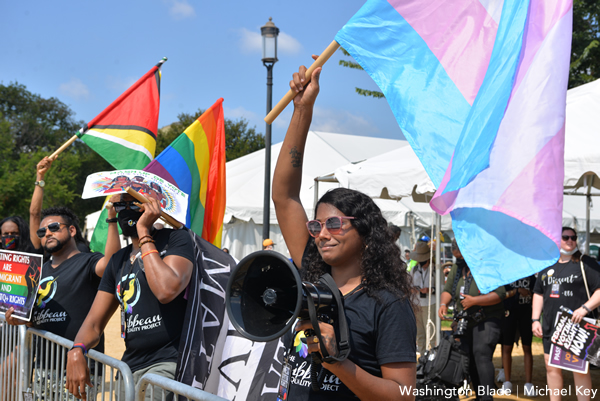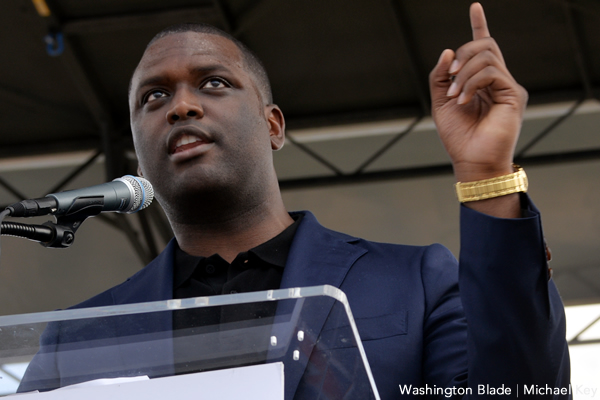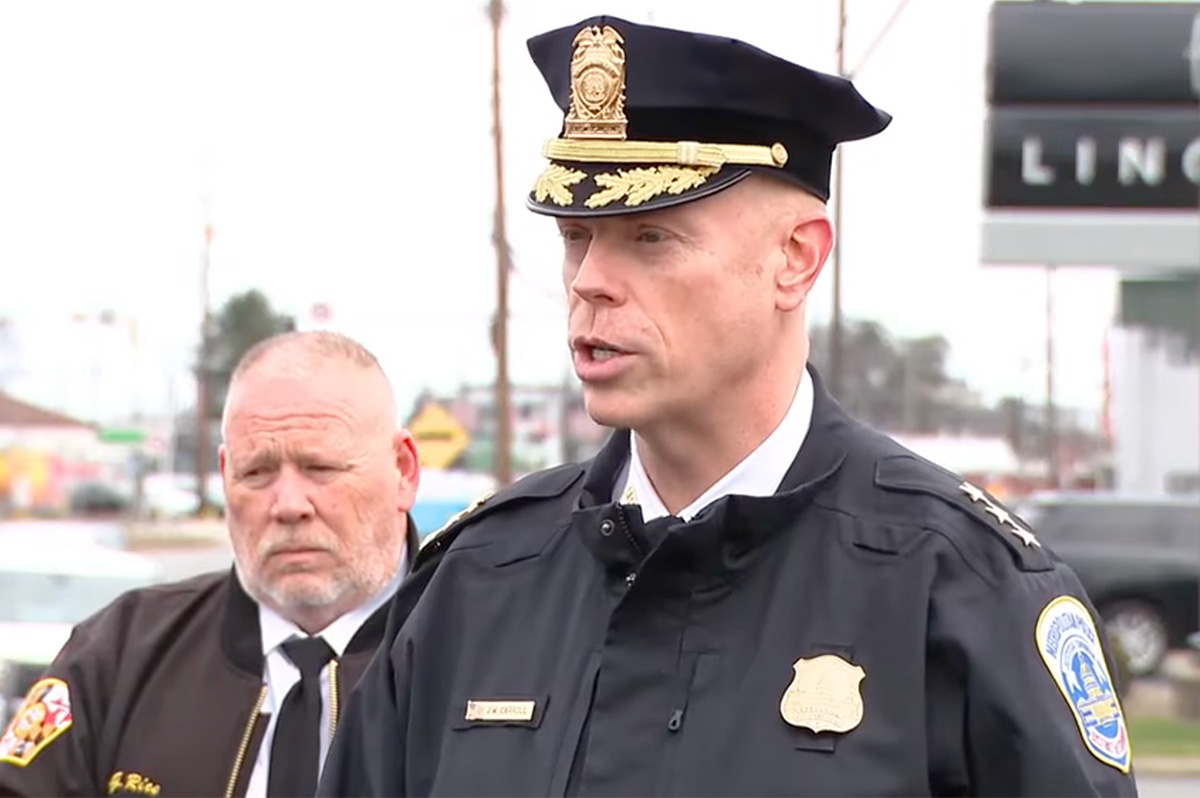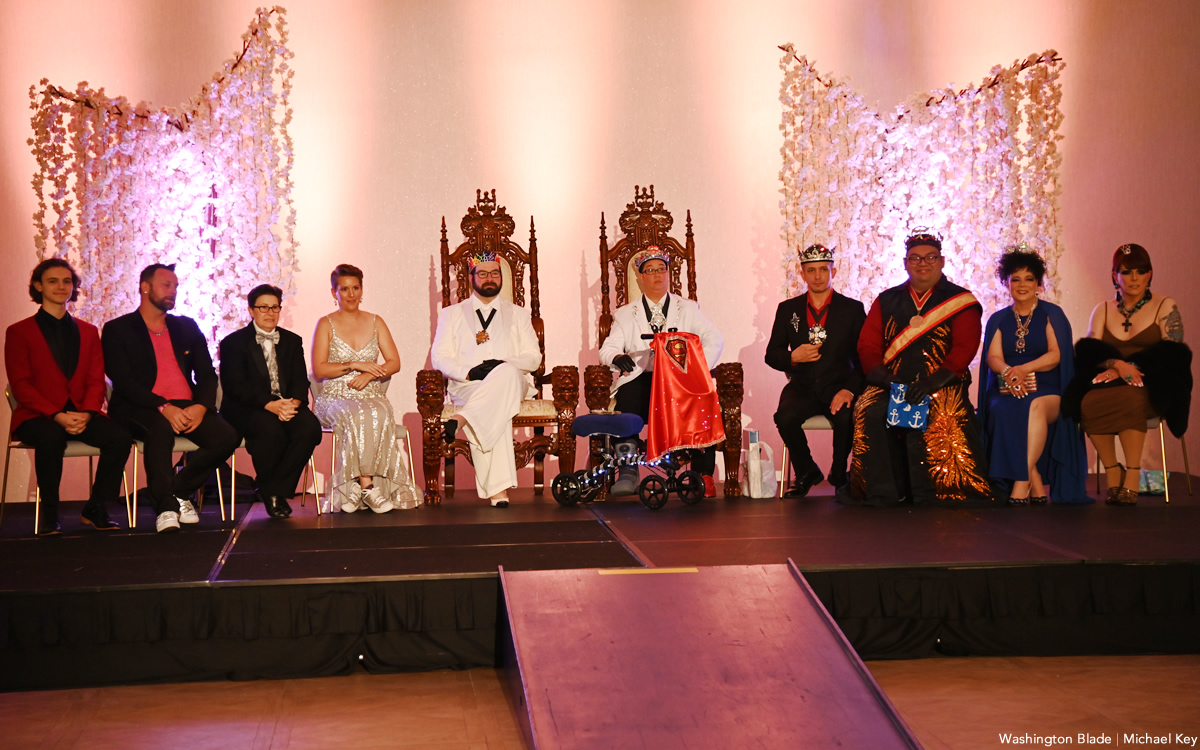Local
LGBTQ activists join D.C. marches for voting rights, statehood
Gay congressman calls on Biden to push for end to filibuster

LGBTQ activists were among the thousands who turned out in the nation’s capital on Aug. 28 for two separate marches and several rallies in support of voting rights and D.C. statehood.
Organizers of the two marches and rallies, which took place at the Lincoln Memorial and the National Mall among other places, timed the events to coincide with the 58th anniversary of the historic 1963 March on Washington organized by the Rev. Dr. Martin Luther King Jr.
“D.C.’s LGBTQIA activists and leaders were seen everywhere Saturday during the March for Voting Rights, handing out statehood signs, canvassing march participants to sign a Statehood petition, and marching to the Mall,” said lesbian activist Barbara Helmick, who serves as a program director for the D.C. statehood advocacy group D.C. Vote.
“D.C. for Democracy’s Kesh Ludduwahetty, D.C. Vote’s volunteer Dennis Jaffe, Capital Stonewall Democrats’ Jatarious Frazier are just a few of the queer activists who organized turnout and worked to make sure that the fight for the freedom includes the 700,000 D.C. residents,” Helmick said.
Helmick was referring to efforts by organizers of the Aug. 28 events to urge Congress to pass a D.C. statehood bill that the House of Representative passed earlier this year, but that is stalled in the Senate.
LGBTQ activists have joined D.C. Mayor Muriel Bowser, who spoke at two of the march rallies on Aug. 28, and D.C. Congressional Del. Eleanor Holmes Norton (D-D.C.), who point out that D.C.’s 700,000 plus residents do not have voting representatives in the U.S. Congress unlike residents of the 50 states.
Also stalled in the Senate are two voting rights bills passed by the House this year that supporters say are aimed at countering as many as 30 laws approved by Republican-controlled legislatures in at least a dozen states that restrict voting by making it harder for minorities to turn out to the polls.
One of the bills, the John Lewis Voting Rights Amendment Act, is named after the late civil rights leader and U.S. Rep. John Lewis (D-Ga.).
“After almost 60 years after John Lewis almost died on the Edmund Pettis Bridge for voting rights, we’re here one more time fighting for voting rights” said Randi Weingarten, the out lesbian president of the American Federation of Teachers, in remarks on the National Mall at the rally for the March On For Washington and Voting Rights.
Weingarten was referring to the Sunday protest march in 1965 that Lewis organized in Alabama for voting rights in which he and other marchers were beaten by Alabama State Troopers as he led the march across the Edmund Pettis Bridge in an incident that became known as Bloody Sunday.
At the same Aug. 28 rally on the National Mall this past Saturday, U.S. Rep. Mondaire Jones (D-N.Y.), who this year became the nation’s first openly gay African-American member of Congress, gave an impassioned speech calling on his fellow Democrats, including President Joe Biden, to push for an end to the Senate filibuster, which Jones said will otherwise be used to kill the voting rights bills.
“We have reached what may well be our last chance to rescue this nation from racist minority rule,” Jones told those attending the rally. “This nation and this world can ill afford to allow white supremacists, misogynists, homophobes and those who deny the effectiveness of vaccines and don’t even want to certify presidential elections to take back control of the United States government,” he said to loud cheers.
“Now there are some who suggest that we do nothing—that we accept the status quo that has led us to this moment of crisis,” Jones continued. “But those of us here today understand that in the Senate and the White House we must act. Yes—the White House,” he said.
“Catch that? The White House, because during the civil rights movement, we had a president of the United States who didn’t just throw up their hands and say, ‘Alright, that’s the Senate’s responsibility to pass voting rights legislation.’”
Jones added, “We need the White House to get involved to end this Jim Crow filibuster…And I’m here to tell you that’s why we’re here today – to demand that President Biden calls on the Senate to abolish the filibuster and pass the For the People [voting rights] Act and the John Lewis Voting Rights Act.”

Following is a transcript of most of Rep. Jones’ speech at the March On For Washington and Voting Rights rally on Aug. 28:
“We have reached what may well be our last chance to rescue this nation from racist minority rule. This nation and this world can ill afford to allow white supremacists, misogynists, homophobes and those who deny the effectiveness of vaccines and don’t even want to certify presidential elections to take back control of the United States government.
“Now there are some who suggest that we do nothing: that we accept the status quo that has led us to this moment of crisis. But those of us here today understand that in the Senate and the White House, we must act. Yes: The White House . . . Catch that? The White House, because during the civil rights movement, we had a President of the United States who didn’t just throw up their hands and say, ‘Alright, that’s the Senate’s responsibility to pass voting rights legislation.’
“We need the White House to get involved to end this Jim Crow filibuster. [Applause]
“If we fail to act in this moment, we are on a path by which democracy dies in darkness.”
“Allow me to paint a picture of that dark future for you, if you will.
“Thanks to partisan Gerrymandering, first the party of Donald Trump will take back control of the House next year, even as Democrats continue to win more votes nationwide.
[Member of the audience yells “Hell no!”]
“Hell no, indeed. Let us make sure that doesn’t happen.
“The party of Donald Trump will also take back the United States Senate with voter suppression in states like Georgia. We gotta make sure that Raphael Warnock comes back to the United States Senate. [Applause]
“The party of Donald Trump under the status quo will win back the presidency in the year 2024 whether because of voter suppression, the anti-democratic Electoral College or because red states have had success in overturning the results of free and fair elections.
“The Supreme Court, which is already under radical right-wing control, will do nothing to stop any of this. The GOP’s two stolen seats will ensure that happens.
“We will all feel the consequences of far-right minority rule. Power will continue to concentrate in the hands of a few. Corporations will continue to deny science and pillage our planet as we will hurtle full speed towards final catastrophe.
“Wealth inequality will widen while the tax bills of the super-rich continue to shrink. They will spend billions to send themselves into space while people on earth starve.
“The cost of housing, healthcare, education will grow even further out of reach for everyday Americans. Civil rights and civil liberties will continue to erode, and our government will have learned nothing from the murder of George Floyd last year.
[Audience: “Shame! Shame!]
“Shame, indeed. Shame . . . shame.
“The next pandemic under the status quo of voter suppression, where people who believe in science are denied the opportunity to serve in government, will rage uncontrolled: causing massive, preventable suffering. And our government, the federal government, captured by powerful special interests and insulated from the will of the American people: the will of all of you, will remain indifferent to that suffering.
“My friends, that road is dark. I don’t want to go down that road. I know that none of you want to go down that road. Thankfully, it doesn’t have to be this way, does it? We are not powerless to stop it. We have a once-in-a-lifetime opportunity to achieve a long-held promise of a permanent, multi-racial democracy. A democracy where your vote, and everyone’s vote, matters because we’ve ended the scourge of partisan gerrymandering. Where you never have to worry about whether yourself or your friends and family are registered to vote because they are registered automatically. Where you don’t need to justify exercising your right to vote by mail. Amen?
“Where teachers and bartenders who aspire to run for office can mount competitive campaigns even if they don’t come from money or from a political family. Where candidates for office make their cases to, We the People where they deserve our support rather than being anointed by billionaires and corporations. Where elections are won by uplifting voters rather than suppressing their votes.
“That is a democracy where the American people are in charge, not a select powerful few. Where every voice and every vote matters. It is a promise that is every bit as worth fighting for as it was when heroes like Dr. King, Byard Rustin, Marsha P. Johnson and John Lewis and so many others fought for our right to vote and for dignity. And in several instances took to these steps in the year 1963. And it is an opportunity that we have never been closer to grasping.
“The senate, as you know, could bring about this vision tomorrow, couldn’t it? But a small handful of senators are standing in our way. These senators cling to the dangerous delusion that ten Republican senators of good conscience are somehow going to join in the fight for democracy when we couldn’t even get a Republican to vote for the John Lewis Voting Rights Act a few days ago.
“Even as we fall further into crisis, these senators have found comfort in a White House that has failed to call for an end to the Jim Crow filibuster. So, I’m here to tell you that power concedes nothing without a demand. And I’m here to tell you that’s why we’re here today: to demand that President Biden calls on the Senate to abolish the filibuster and pass the For the People Act and the John Lewis Voting Rights Act.
“We know the future that we want for ourselves, for our families, for our country. And we aren’t going to wait until that future is won.
“Thank you so much.”
District of Columbia
New interim D.C. police chief played lead role in security for WorldPride
Capital Pride says Jeffery Carroll had ‘good working relationship’ with organizers

Jeffery Carroll, who was named by D.C. Mayor Muriel Bowser on Dec. 17 as the city’s Interim Chief of Police, played a lead role in working with local LGBTQ community leaders in addressing public safety issues related to WorldPride 2025, which took place in D.C. last May and June
“We had a good working relationship with him, and he did his job in relation to how best the events would go around safety and security,” said Ryan Bos, executive director of Capital Pride Alliance.
Bos said Carroll has met with Capital Pride officials in past years to address security issues related to the city’s annual Capital Pride parade and festival and has been supportive of those events.
At the time Bowser named him Interim Chief, Carroll had been serving since 2023 as Executive Assistant Chief of Specialized Operations, overseeing the day-to-day operation of four of the department’s bureaus. He first joined the D.C. Metropolitan Police Department in 2002 and advanced to multiple leadership positions across various divisions and bureaus, according to a statement released by the mayor’s office.
“I know Chief Carroll is the right person to build on the momentum of the past two years so that we can continue driving down crime across the city,” Bowser said in a statement released on the day she announced his appointment as Interim Chief.
“He has led through some of our city’s most significant public safety challenges of the past decade, he is familiar with D.C. residents and well respected and trusted by members of the Metropolitan Police Department as well as our federal and regional public safety partners,” Bowser said.
“We have the best police department in the nation, and I am confident that Chief Carroll will meet this moment for the department and the city,” Bowser added.
But Bowser has so far declined to say if she plans to nominate Carroll to become the permanent police chief, which requires the approval of the D.C. City Council. Bowser, who announced she is not running for re-election, will remain in office as mayor until January 2027.
Carroll is replacing outgoing Chief Pamela Smith, who announced she was resigning after two years of service as chief to spend more time with her family. She has been credited with overseeing the department at a time when violent crime and homicides declined to an eight-year low.
She has also expressed support for the LGBTQ community and joined LGBTQ officers in marching in the WorldPride parade last year.
But Smith has also come under criticism by members of Congress, who have accused the department of manipulating crime data allegedly showing lower reported crime numbers than actually occurred. The allegations came from the Republican-controlled U.S. House Oversight Committee and the U.S. Justice Department
Bowser has questioned the accuracy of the allegations and said she has asked the city’s Inspector General to look into the allegations.
Meanwhile, a spokesperson for the D.C. police Office of Public Affairs did not immediately respond to a question from the Washington Blade about the status of the department’s LGBT Liaison Unit. Sources familiar with the department have said a decline in the number of officers currently working at the department, said to be at a 50-year low, has resulted in a decline in the number of officers assigned to all of the liaison units, including the LGBT unit.
Among other things, the LGBT Liaison Unit has played a role in helping to investigate hate crimes targeting the LGBTQ community. As of early Wednesday an MPD spokesperson did not respond to a question by the Blade asking how many officers are currently assigned to the LGBT Liaison Unit.
Arts & Entertainment
2026 Most Eligible LGBTQ Singles nominations
We are looking for the most eligible LGBTQ singles in the Washington, D.C. region.

Are you or a friend looking to find a little love in 2026? We are looking for the most eligible LGBTQ singles in the Washington, D.C. region. Nominate you or your friends until January 23rd using the form below or by clicking HERE.
Our most eligible singles will be announced online in February. View our 2025 singles HERE.
District of Columbia
Imperial Court of Washington drag group has ‘dissolved’
Board president cites declining support since pandemic

The Imperial Court of Washington, a D.C.-based organization of drag performers that has raised at least $250,000 or more for local LGBTQ and non-LGBTQ charitable groups since its founding in 2010, announced on Jan. 5 that it has ended its operations by dissolving its corporate status.
In a Jan. 5 statement posted on Facebook, Robert Amos, president of the group’s board of directors, said the board voted that day to formally dissolve the organization in accordance with its bylaws.
“This decision was made after careful consideration and was based on several factors, including ongoing challenges in adhering to the bylaws, maintaining compliance with 501(c)(3) requirements, continued lack of member interest and attendance, and a lack of community involvement and support as well,” Amos said in his statement.
He told the Washington Blade in a Jan. 6 telephone interview that the group was no longer in compliance with its bylaws, which require at least six board members, when the number of board members declined to just four. He noted that the lack of compliance with its bylaws also violated the requirements of its IRS status as a nonprofit, tax-exempt 501(c) (3) organization.
According to Amos, the inability to recruit additional board members came at a time when the organization was continuing to encounter a sharp drop in support from the community since the start of the COVID pandemic around 2020 and 2021.
Amos and longtime Imperial Court of Washington member and organizer Richard Legg, who uses the drag name Destiny B. Childs, said in the years since its founding, the group’s drag show fundraising events have often been attended by 150 or more people. They said the events have been held in LGBTQ bars, including Freddie’s Beach Bar in Arlington, as well as in other venues such as theaters and ballrooms.
Among the organizations receiving financial support from Imperial Court of Washington have been SMYAL, PFLAG, Whitman-Walker Health’s Walk to End HIV, Capital Pride Alliance, the DC LGBT Community Center, and the LGBTQ Fallen Heroes Fund. Other groups receiving support included Pets with Disabilities, the Epilepsy Foundation of Washington, and Grandma’s House.
The Imperial Court of Washington’s website, which was still online as of Jan. 6, says the D.C. group has been a proud member of the International Court System, which was founded in San Francisco in 1965 as a drag performance organization that evolved into a charitable fundraising operation with dozens of affiliated “Imperial Court” groups like the one in D.C.
Amos, who uses the drag name Veronica Blake, said he has heard that Imperial Court groups in other cities including Richmond and New York City, have experienced similar drops in support and attendance in the past year or two. He said the D.C. group’s events in the latter part of 2025 attracted 12 or fewer people, a development that has prevented it from sustaining its operations financially.
He said the membership, which helped support it financially through membership dues, has declined in recent years from close to 100 to its current membership of 21.
“There’s a lot of good we have done for the groups we supported, for the charities, and the gay community here,” Amos said. “It is just sad that we’ve had to do this, mainly because of the lack of interest and everything going on in the world and the national scene.”
-

 Photos4 days ago
Photos4 days agoThe year in photos
-

 Sponsored3 days ago
Sponsored3 days agoSafer Ways to Pay for Online Performances and Queer Events
-

 District of Columbia2 days ago
District of Columbia2 days agoTwo pioneering gay journalists to speak at Thursday event
-

 a&e features2 days ago
a&e features2 days agoQueer highlights of the 2026 Critics Choice Awards: Aunt Gladys, that ‘Heated Rivalry’ shoutout and more


















